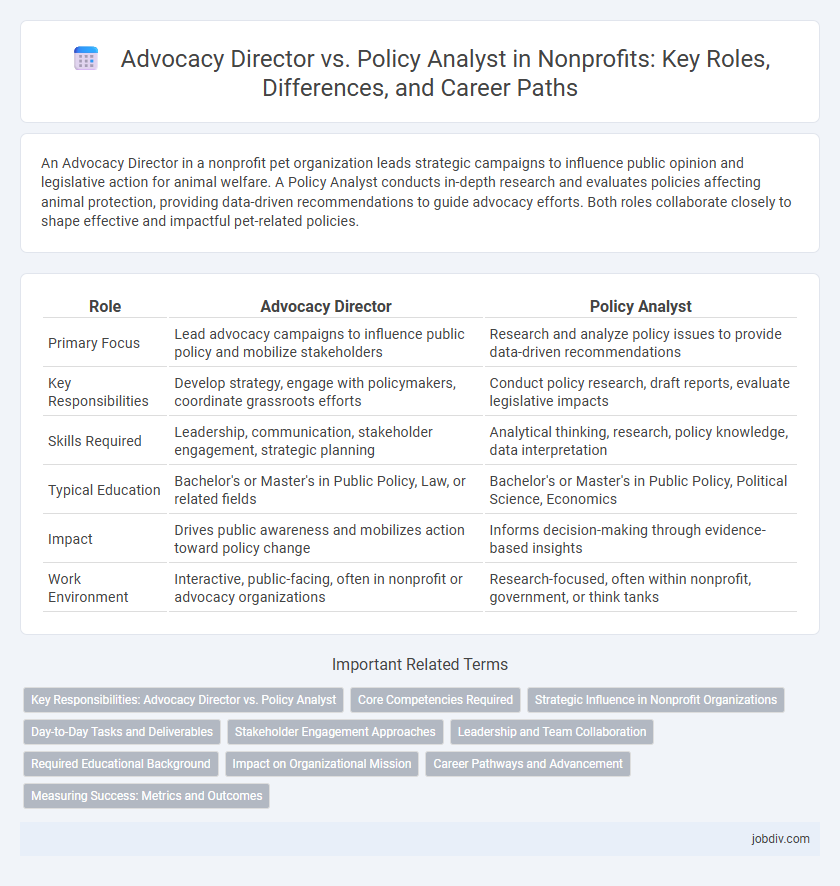An Advocacy Director in a nonprofit pet organization leads strategic campaigns to influence public opinion and legislative action for animal welfare. A Policy Analyst conducts in-depth research and evaluates policies affecting animal protection, providing data-driven recommendations to guide advocacy efforts. Both roles collaborate closely to shape effective and impactful pet-related policies.
Table of Comparison
| Role | Advocacy Director | Policy Analyst |
|---|---|---|
| Primary Focus | Lead advocacy campaigns to influence public policy and mobilize stakeholders | Research and analyze policy issues to provide data-driven recommendations |
| Key Responsibilities | Develop strategy, engage with policymakers, coordinate grassroots efforts | Conduct policy research, draft reports, evaluate legislative impacts |
| Skills Required | Leadership, communication, stakeholder engagement, strategic planning | Analytical thinking, research, policy knowledge, data interpretation |
| Typical Education | Bachelor's or Master's in Public Policy, Law, or related fields | Bachelor's or Master's in Public Policy, Political Science, Economics |
| Impact | Drives public awareness and mobilizes action toward policy change | Informs decision-making through evidence-based insights |
| Work Environment | Interactive, public-facing, often in nonprofit or advocacy organizations | Research-focused, often within nonprofit, government, or think tanks |
Key Responsibilities: Advocacy Director vs. Policy Analyst
Advocacy Directors lead strategic campaigns to influence public policy and mobilize community support, overseeing communication efforts and coalition-building initiatives. Policy Analysts conduct in-depth research, analyze legislative developments, and provide data-driven recommendations to inform advocacy strategies. Both roles collaborate to shape effective policy outcomes, with the Advocacy Director focusing on external engagement and the Policy Analyst concentrating on evidence-based policy evaluation.
Core Competencies Required
Advocacy Directors require strong leadership, strategic communication, and coalition-building skills to effectively mobilize stakeholders and drive public support for nonprofit causes. Policy Analysts must possess exceptional research abilities, data analysis expertise, and a deep understanding of legislative processes to evaluate policy impacts and provide actionable recommendations. Both roles demand proficiency in stakeholder engagement and a thorough knowledge of the nonprofit sector's regulatory environment.
Strategic Influence in Nonprofit Organizations
An Advocacy Director spearheads strategic influence by developing comprehensive advocacy campaigns, mobilizing stakeholders, and shaping public opinion to align with the nonprofit's mission. A Policy Analyst supports this role by conducting in-depth research, analyzing legislation, and providing data-driven recommendations that inform advocacy strategies. Together, they enhance the nonprofit's ability to effect systemic change through targeted policy and public engagement initiatives.
Day-to-Day Tasks and Deliverables
An Advocacy Director leads strategic campaigns, manages stakeholder relationships, and oversees communication efforts to influence public policy and promote the nonprofit's mission. A Policy Analyst conducts thorough research, evaluates legislation, and prepares detailed reports and policy briefs to inform decision-making. While the Advocacy Director focuses on external engagement and broad impact, the Policy Analyst concentrates on data-driven analysis and internal policy recommendations.
Stakeholder Engagement Approaches
An Advocacy Director leads strategic stakeholder engagement by building coalitions and mobilizing community support to influence public policy decisions effectively. A Policy Analyst conducts in-depth research and provides evidence-based recommendations, facilitating informed dialogue with policymakers and key stakeholders. Both roles prioritize transparent communication and collaborative approaches to advance nonprofit advocacy goals.
Leadership and Team Collaboration
Advocacy Directors lead nonprofit teams by setting strategic directions and fostering cross-departmental collaboration to drive impactful advocacy campaigns. Policy Analysts support leadership by conducting research, evaluating policy implications, and providing data-driven recommendations that inform decision-making processes. Both roles require strong communication skills and teamwork, but the Advocacy Director emphasizes leadership and coordination, while the Policy Analyst focuses on specialized policy expertise and analysis.
Required Educational Background
An Advocacy Director typically requires a master's degree in public policy, social work, or a related field, emphasizing leadership and strategic communication skills for effective nonprofit advocacy. A Policy Analyst often holds a degree in political science, economics, or public administration, focusing on data analysis, research methods, and policy evaluation essential for shaping evidence-based recommendations. Both roles demand strong analytical abilities but differ in educational specialization tied to their distinct responsibilities within nonprofit organizations.
Impact on Organizational Mission
An Advocacy Director drives organizational mission by crafting and leading strategic campaigns that influence public opinion and legislative agendas, maximizing reach and engagement with stakeholders. A Policy Analyst supports this mission through rigorous research, data analysis, and policy evaluation, ensuring advocacy efforts are evidence-based and aligned with regulatory frameworks. Both roles collaboratively enhance mission impact by combining visionary leadership with analytical precision to shape effective, sustainable change.
Career Pathways and Advancement
An Advocacy Director typically leads strategic campaigns and manages stakeholder relationships, requiring extensive experience in nonprofit leadership and communication. In contrast, a Policy Analyst focuses on research, data interpretation, and policy development, often serving as a foundation for advancing into senior advocacy or program management roles. Career pathways in advocacy offer broader leadership opportunities, while policy analysis provides specialized expertise critical for influencing legislative and regulatory decisions.
Measuring Success: Metrics and Outcomes
Advocacy Directors measure success by tracking campaign reach, stakeholder engagement, and policy changes influenced, leveraging metrics such as coalition growth and legislative wins. Policy Analysts focus on data accuracy, analyzing policy impact assessments, and evaluating quantitative outcomes like cost-benefit ratios and demographic effects. Both roles prioritize evidence-based outcomes but differ in emphasis: Advocacy Directors on mobilization effectiveness and Policy Analysts on empirical policy evaluation.
Advocacy Director vs Policy Analyst Infographic

 jobdiv.com
jobdiv.com